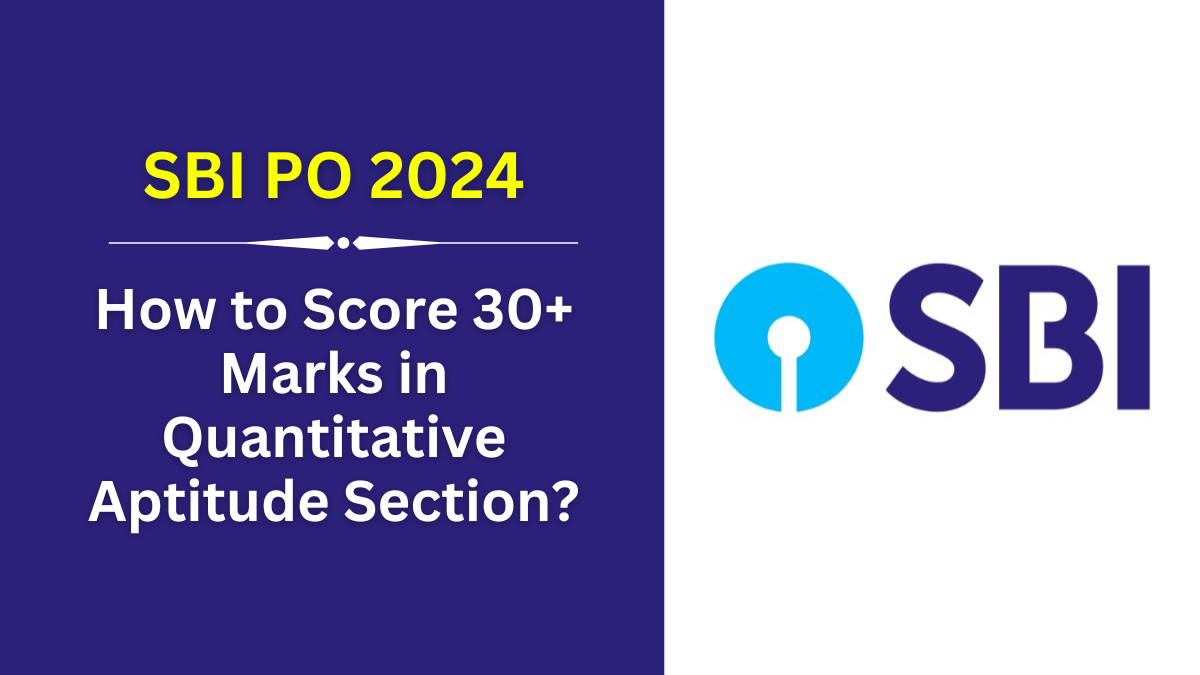Table of Contents
The first important stage of the SBI PO 2024 exam selection process is the preliminary exam, this stage is also important because it is the gateway to get selected in SBI PO 2024, only after this candidates can appear in the main exam. An important section in this preliminary exam is Quantitative Aptitude. In this article, we will discuss effective strategies like how to score 30+ marks in Quantitative Aptitude section of SBI PO exam?, it is necessary to follow some effective strategies. According to the expert advice of Bankers Ada 247, first of all, candidates should practice regularly to strengthen their mathematical skills.
Strategy to Score 30+ Marks in Quantitative Aptitude
In the SBI PO 2024 preliminary exam, the Quantitative Aptitude section will have a total of 35 questions carrying a total of 35 marks. Candidates will have 20 minutes to complete this section. Since this is an important component of the exam, effective time management and thorough preparation is essential to maximize your score. To score well in this section, candidates must have a strong hold on almost all the topics and basically speed maths as this topic is scoring and time consuming.
Key Topics of Quantitative Aptitude for SBI PO 2024 Exam
In the Quantitative Aptitude section of the SBI PO 2024 exam, candidates should focus on key topics such as Simplification, Profit and Loss, Mixture and Allegation, and Simple Interest and Compound Interest. Work and Time, Time and Distance, and Measurements (Cylinders, Cones, Spheres) are essential for problem-solving. Data Interpretation tests logical skills, while Ratio and Proportion, Percentage, and Number System are frequently tested. Additionally, Sequence and Series, and Permutation, Combination, and Probability are important for comprehensive preparation. Mastering these topics will help candidates score well and increase their chances of success in the exam.
| Topic | Description |
| Simplification | Basic calculations and arithmetic operations. |
| Profit & Loss | Understanding percentage-based calculations related to profit and loss. |
| Mixtures & Allegations | Problems involving mixtures, ratios, and allegations. |
| Simple Interest & Compound Interest | Key formulas and concepts related to interest calculations. |
| Work & Time | Problems related to work efficiency and time calculations. |
| Time & Distance | Questions involving rates, speed, and time. |
| Mensuration (Cylinder, Cone, Sphere) | Geometry problems involving 3D shapes. |
| Data Interpretation | Graph-based questions requiring analysis and interpretation of data. |
| Ratio & Proportion, Percentage | Essential concepts used in various quantitative problems. |
| Number Systems | Understanding the basics of number systems, including fractions and decimals. |
| Sequences & Series | Arithmetic and geometric sequences and series. |
| Permutation, Combination & Probability | Problems involving counting methods and probability theory. |
How to Score 30+ Marks in Quantitative Aptitude
Scoring 30+ marks in the Quantitative Aptitude section of the SBI PO Prelims exam requires a focused and systematic approach. Here are some tips and strategies that can help:
Complete Your Syllabus
The first task of the candidate is to complete the syllabus of Quantitative Aptitude. Make sure that you have thoroughly completed the entire syllabus for Quantitative Aptitude, which includes topics like Simplification, Number Series, Data Interpretation, Quadratic Equations, Profit and Loss, Time and Work, and others. It is important to understand each topic to solve different types of questions in the exam.
Build Strong Conceptual Knowledge
Focus on understanding the fundamental concepts behind each topic. This helps in tackling any tricky question and applying the concepts in different ways. Clear the small concepts of each topic and make sure you are comfortable with the formulas, so that you can easily recall them during the exam.
Focus on Calculation Speed
Speed is essential in the Quant section, as the preliminary exam is just a game of speed. If you increase your calculation speed along with accuracy, then your chances of success are high. For this, candidates should practice doing calculations quickly and accurately. Use techniques like approximation, eliminating options, and mental calculations to save time on long questions.
Make Your Own Shortcuts and Tricks
Most of the tricks that work in the exam are self-made, and over time, candidates develop their own shortcuts and tricks to solve problems faster. This may include using certain patterns in number series or shortcuts in arithmetic problems. This not only saves time but also increases your confidence during the exam.
Give Mocks/Sectional Mocks and Quizes
Regular practice is very important to improve performance. Take mock tests, sectional tests and online quizzes regularly to improve the exam environment. All these quizzes and mocks are easily available on Adda 247 Test Prime, where candidates can take all types of tests from one place. After taking the test, focus on analysing your mistakes and improving your weak areas. This will also help you manage time during the actual exam.
Work on Weak Areas
Identify the topics that you find difficult and give extra time to improve them. You can identify this by looking at previous years’ papers or by taking mock tests. Whether it is data interpretation, speed math or any other area, targeted practice will help you turn these weaknesses into your strengths.
Improve Your Accuracy
Accuracy is as important as speed. Try not to make careless mistakes, especially in calculations. Avoid making such mistakes. Accuracy along with speed is very important, because only accuracy will get you selected. You can increase your accuracy by practising mental math, double-checking calculations and being cautious with negative marks, percentages and other details.
Revise Daily Previous Year Papers
Constant revision is the key to remembering. Dedicate a few hours daily to solving problems and revising concepts. Also, solving previous year question papers will help you understand the exam pattern, difficulty level and the type of questions commonly asked. For this you can take the help of Adda 247 Test Prime.
Do Regular Practice
Make practice a habit. The more you practice, the more familiar you will be with the types of questions and the better your speed and accuracy will be. Regular practice takes you one step ahead of other students daily. Practice should cover all areas: from simple calculations to complex problem-solving. Include it in your daily timetable.
| Related Posts | |
| SBI PO Cut-Off | SBI PO Notification |
| SBI PO Salary | SBI PO Preparation Strategy |
| SBI PO Exam Date | SBI PO Previous Year Question Papers |
| SBI PO Syllabus | SBI PO Exam Pattern |




 How to Score 18+ Marks in the English La...
How to Score 18+ Marks in the English La...
 30 Days Study Plan to Crack SBI Clerk 20...
30 Days Study Plan to Crack SBI Clerk 20...
 SBI Clerk Mains Exam Preparation Tips 20...
SBI Clerk Mains Exam Preparation Tips 20...





